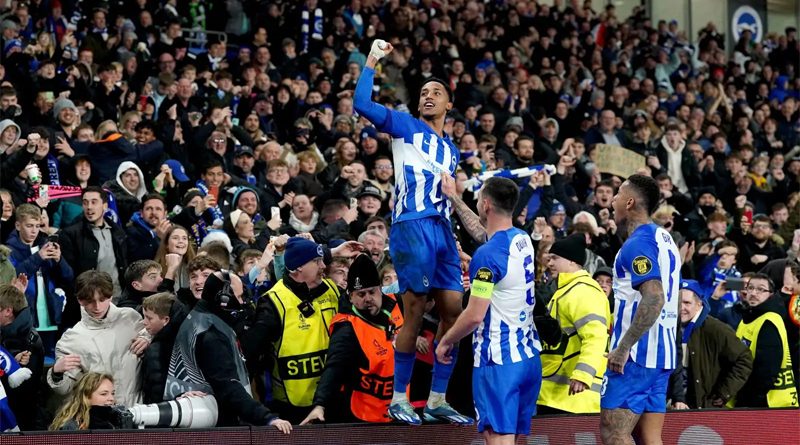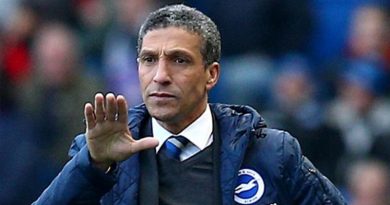Albion flourishing among Europe elite
On the Brighton and Hove City Crest it says “Inter Undas et Colles floremus” – which translates from Latin into English to mean “Between Downs and Sea we flourish”.
But when it comes to the city’s local football club, flourishing is a word that can probably only be used to describe the Albion in its very recent history.
Flourishing and thriving, in fact. The success story of the past decade meant that on a cold Thursday night in December, the City of Brighton & Hove had the privilege of welcoming Marseille – a former European Champion and one of the biggest names in football.
Marseille is indeed a club and a place with significant heritage. The city was founded in 600 BC, making it the oldest in France, as well as one of Europe’s oldest continuously inhabited settlements.
Fast forward to modern times and Marseille – like many of Europe’s large port cities – has a broad and vibrant cultural identity.
One of the its main modern symbols is the football team and their home stadium, the Stade Velodrome. Brighton of course visited this iconic venue earlier in the competition.
So, to say the visit of the famous French city’s football team to Sussex by the Sea for the final match of the Europa League group stage was an exciting moment for Brighton & Hove would be an understatement.
Marseille are veterans of European football. As well as their Champions League win in the 1990s, they have reached the final of the Europa League in its various guises three times.
All three of those finals have admittedly been lost, most recently a 3-0 defeat to Antoine Griezmann’s Atletico Madrid in 2018.
But they are indeed a big club. One very much like fellow Group B competitors Ajax – a great history domestically and in Europe, but who in modern times have seen success harder to come by.
This is partly down to the domestic French league struggling commercially up against the big three of the Premier League, La Liga and Serie A. And there is also the fact Marseille and the rest of Ligue 1 have been dominated by the Qatari-funded Paris Saint Germain.
Still, Marseille regard themselves as giants of European football. Before their visit to the Amex, former Marseille and England winger Chris Waddle told the Albion matchday programme: “For me, Marseille are a club that should always be in the Champions League and always competing for the French league title.”
These are the waters Brighton now swim in, although the Albion did not make an ideal start to their first European campaign.
It got underway on the wrong foot with Lewis Dunk’s surprise omission from the opening game at home to AEK Athens, and the subsequent defensive failings that saw them lose that night by conceding three rather sloppy goals.
Then there was the dramatic 2-2 draw away against Marseille from 2-0 down. Before that second half comeback, many of us no doubt thought we would be saying a quick au revoir to Europe.
The Albion appeared lost amongst clubs with the history and standings of Ajax, Marseille and AEK. But thank God reputations have proven so flimsy for many of the teams that Brighton have faced and overcome throughout the past year or so, both in the Premier League and in Europe.
After that draw in France, Ajax came to the Amex and seemingly brought their reserve side. At least I can only assume so, given how rubbish and easily bullied they were.
Subsequent wins in Amsterdam and Athens secured the Seagulls’ place in the knockout stages. Almost as importantly, those victories have led to a feeling that Brighton and Hove Albion may well belong on this level alongside some of the great names of European football.
And the December evening that Marseille came to Brighton may be the moment that the club really staked a claim as a genuine contender to win the Europa League this season.
It was a tight and tense affair throughout. The type of match the Albion faithful have not really been used to since Roberto De Zerbi took charge last year. And as such, you could feel the frustration among many of its supporters watching on nervously.
As was the manager. De Zerbi isn’t one to hold back his emotions, and poor Simon Adingra was on the end of a fair amount of his frustration in the first half.
When on the pitch the Ivorian was busy, if ultimately without an end product. Although his proximity to the Italian in the first half on Albion’s right hand side, in front of the home dugout probably didn’t help.
Adingra’s departure just after the hour mark therefore wasn’t a surprise, but his replacement Evan Ferguson was not anymore successful.
You can though always rely on Pascal Gross. After some good Brighton interplay through the middle of the Marseille midfield, Gross quickly threaded a pass through to Joao Pedro in the penalty area.
The Brazilian still had a lot to do. Despite the attention of two Marseille defenders, Pedro calmly collected the ball in his stride, took his time and blasted into the top corner of the goal in front of the North Stand to give the Albion an historic win.
With that, the Amex erupted. Chaotic celebrations ensued and the final minutes were played out in front of a boisterous and now mostly standing crowd. What a moment. What a night.
Back in the early 1980s when Brighton were in their first spell as a top flight club, attendances and season ticket sales failed to counterbalance the ambitious investment made to take the Albion into Division One.
Chairman Mike Bamber is reported to have said in response: “I have been bitterly disappointed at the very poor sale of season tickets and wonder if the Sussex public really want First Division football.”
That certainly isn’t the case for the Sussex football attending public of modern times. But what of Europe? What does the continent make of the Albion?
Personally, I am not sure the European football establishment wants Brighton in European football, upsetting the applecart.
But if recent events are anything to go by, they are going to have to get used to it.
Up the Albion.
Phil




